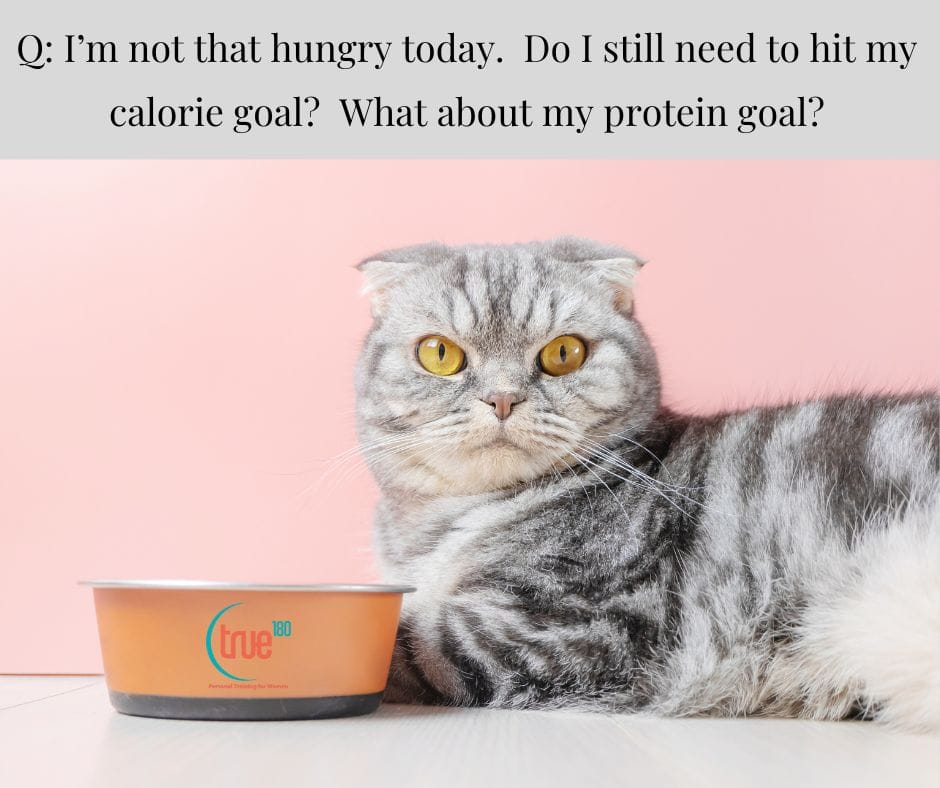Q: I’m not that hungry today. Do I still need to hit my calorie goal? What about my protein goal?
A: You never need to force yourself to eat more than is comfortable, and you still need to get your protein in. (Also, I am jealous of you for not being that hungry today. LOL.)
If your goal is weight loss, the calorie guideline we give you is a ceiling vs a goal to strive for. Meaning the goal is to stay under it, not to eat it all. Regardless of your goal, the minimum protein guideline we gave you is the floor – you want to get there, and it is ok to exceed it.
Eat the protein first
If you are currently having the “problem” of feeling too full too fast, be sure to eat your protein first. This is because protein is the most filling part of any meal, and waiting until the end means you probably won’t eat very much, if any of it. (If you have the opposite problem – feeling hungry too often, then this advice to eat protein first, is even more important because it helps you feel more full than any other nutrient. Fat, by contrast, is the least filling.)
But, what about crashing my metabolism?
“Crashing” your metabolism from “undereating” is a concept you can find on the internet, but this is bullsh#t. For starters when you see “crash your metabolism,” or “ruin your metabolism” online these terms are never defined. How much would your resting metabolism* have to decrease for it to qualify as “crashed” or “ruined”?
Furthermore, the terms “starvation” or “undereating” are rarely defined in any accurate or meaningful way. Perhaps these writers are philosophically committed to deconstructionism where words have no meanings. However, if we could ask the spirits of any of the victims of the famines created by Stalin (3-7 million) or by Mao (20-40 million) they would say the word “starvation” has a meaning, and that no amount of circle talk can change that meaning. Starvation means eating so little that you die.
The inconvenient truth about losing weight is that it requires eating less than you burn, and some, pejoratively, label this “undereating.” More accurately this is eating in a calorie deficit. A side effect of being in a calorie deficit is being hungry (hungry is not at all the same as starving). Before calories were so easy & plentiful, and before we got sold on the idea that we needed to graze all day like a cow, humans used to get hungry many times a day… and, we, as a species, survived.
*Resting metabolism (resting metabolic rate, or BMR) is the number of calories your body burns at rest. The more you weigh the more you burn at rest. Exercise (if it is strenuous enough) increases this number for a few hours or a few days. The less you weigh the less you burn. Yes, more muscle will maximize the calories burned per pound (a good thing), but BMR is limited by your body weight.
We’ve lost our minds
As a society we have lost our collective minds. In 1980 we had an obesity rate of 13%, and in 2020 it had climbed up to 43%, and yet nutrition apps like MyFitnessPal(MFP) will not let you submit your day if you have eaten “too little.” The app will occasionally annoy you for eating too much sugar, or too much sodium, but it will never chastise you for eating double or triple your calorie needs for the day.
However, even if you are a 4’11”, office working female who wants to lose weight, and you dare to eat only 1190 calories you (1) can’t submit your day, and (2) will be warned about the “serious health problems” caused by eating too little.
Bottom Line
Ignore anyone trying to gaslight you by telling you “to lose weight you must eat more.” For weight loss the calorie guideline is a limit to stay under vs a goal to achieve. If you get full before you hit the ceiling do a happy dance. Regardless of your goal, the protein guideline is the floor – the minimum.

